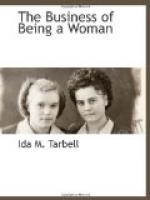The idea that there is a kind of inequality for a woman in minding her own business and letting man do the same, comes from our confused and rather stupid notion of the meaning of equality. Popularly we have come to regard being alike as being equal. We prove equality by wearing the same kind of clothes, studying the same books, regardless of nature or capacity or future life. Insisting that women do the same things that men do, may make the two exteriorly more alike—it does not make them more equal. Men and women are widely apart in functions and in possibilities. They cannot be made equal by exterior devices like trousers, ballots, the study of Greek. The effort to make them so is much more likely to make them unequal. One only comes to his highest power by following unconsciously and joyfully his own nature. We run the risk of destroying the capacity for equality when we attempt to make one human being like another human being.
The theory that the class of free women considered here would be fired to unselfish interest in uncared-for youth if they were included in the electorate of the nation is hardly sustainable. The ballot has not prevented the growth of a similar class of men. Something more biting than a new tool is needed to arouse men and women who are absorbed in self—some poignant experience which thrusts upon their indolent minds and into their restricted visions the actualities of life.
It should be said, however, that the recent agitation for the ballot has served as such an experience for a good many women, particularly in the East. Perhaps for the first time they have heard from the suffrage platform of the “little mother,” the factory child, the girl living on $6 a week. They have done more than espouse the suffrage cause for the sake of the child; they have gone out to find where they could serve.




